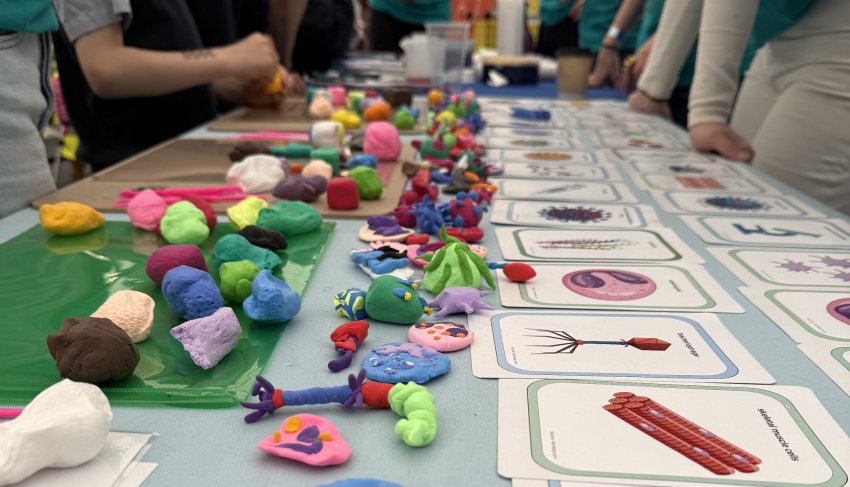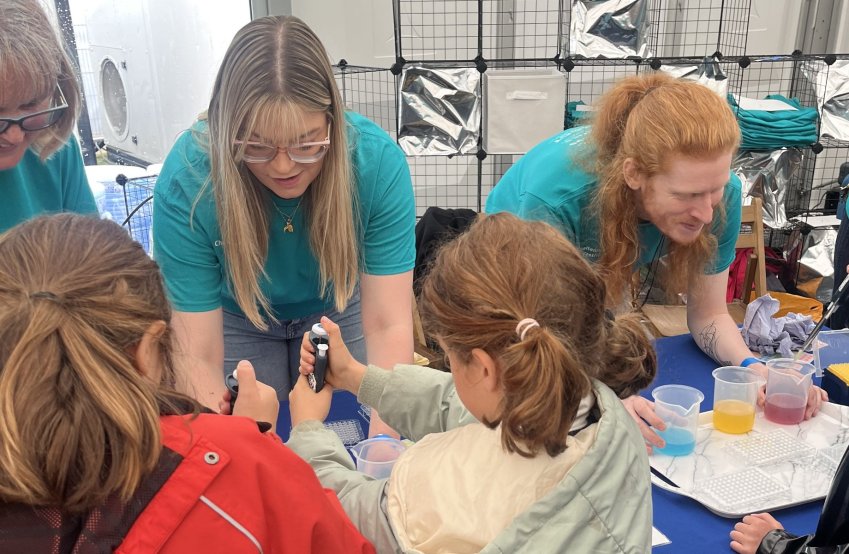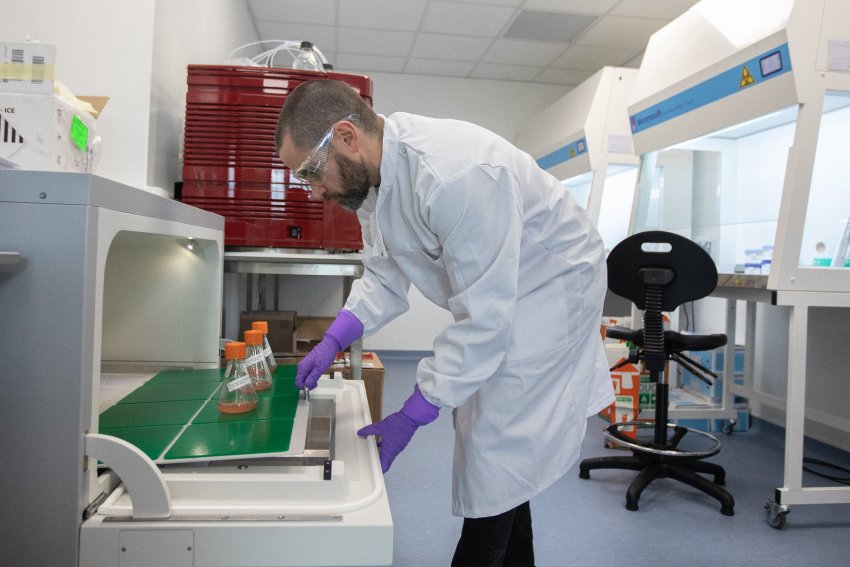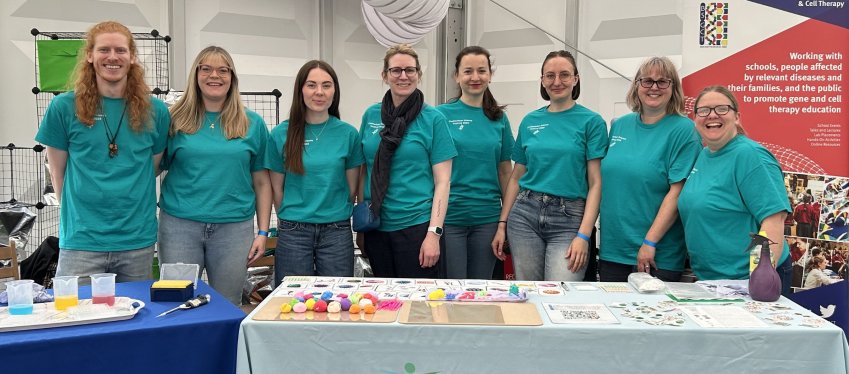Cheltenham Science Festival 2025: The future of medicine through gene therapy innovation

Cheltenham Science Festival 2025 was a celebration of innovation, scientific discovery, and public engagement. This event brought together experts, researchers, and curious minds from across the UK. Among the many contributors at this year’s event were representatives from the Innovation Hubs for Gene Therapies, who hosted a vibrant interactive stand aimed at increasing public awareness and understanding of gene therapies, and inspiring the next generation of scientists.
Engaging the Public through Hands-On Science
The Innovation Hubs brought science to life through a series of engaging activities designed for children, young people, and families. Attendees explored creative stations including pipette races, clay modelling of viruses and cells, temporary science-themed tattoos, and a virtual reality experience that took the user on a journey inside a cell and gave them a chance to explore a laboratory environment.

These activities translated complex scientific ideas into fun and memorable learning experiences. Several primary school pupils even impressed volunteers by correctly naming different cell types and their role within the body, highlighting the enthusiasm for STEM subjects within early education.
The VR headsets were provided through the Hubs’ partnership with RESILIENCE: Medicines Manufacturing Skills Centre of Excellence, demonstrating the initiative’s commitment to collaboration. The Innovation Hubs also partnered with the British Society for Gene and Cell Therapy (BSGCT) to further enhance outreach efforts.
Collaboration at the Cheltenham Science Festival
Collaboration is vital for the Innovation Hubs. As a government and charity funded initiative, the Hubs work alongside a range of partners to accelerate innovation and address shared challenges across the gene therapy sector. Collaborating with BSGCT and RESILIENCE to deliver an interactive stand at the Cheltenham Science Festival demonstrated how strategic partnerships can increase public awareness, strengthen scientific networks, and drive progress across research, manufacturing, and regulation. These partnerships support not only outreach, but also the wider goals of knowledge exchange, skills development, and inclusivity, ensuring that the UK advanced therapies sector is well-positioned for the future.
The Hubs' Mission
The Innovation Hubs’ participation in the festival was not only about sparking interest in science, but also part of a broader mission to raise public awareness of gene therapy and its transformative potential. Funded by LifeArc, the Medical Research Council (MRC), and the Biotechnology and Biological Sciences Research Council (BBSRC), the Innovation Hubs aim to accelerate the development of gene therapies by offering expert support in manufacturing, regulation, and clinical translation.
Their presence at Cheltenham helped to spotlight the work of the Innovation Hubs: providing access to state-of-the-art manufacturing facilities, translational and regulatory advice, supporting funding applications, and offering training. By increasing visibility and understanding of gene therapy, the Innovation Hubs are contributing to building a skilled workforce for the future.
To support this mission, the Innovation Hubs provide educational resources for gene therapy and manufacturing. As Dr Sven Kili, Chair of the Innovation Hubs Coordinating Committee explains:
"Gene therapies provide a paradigm shift in how we are able to treat a wide range of conditions. They treat or prevent diseases by replacing or repairing a mutated gene, thereby addressing the underlying genetic problem, with potentially curative effects."
Whether you are a student, researcher, or industry professional, the Hubs provide valuable educational resources about gene and cell therapies. To explore the full range of training opportunities, resources, and support services offered by the Innovation Hubs for Gene Therapies, visit: www.genetherapyhubs.uk.
The Innovation Hubs: Progress and Impact
Established through an initial £18 million investment, which has now leveraged over £37.4 million of additional financial support, the Innovation Hubs for Gene Therapies have rapidly become a key part of the UK’s life sciences infrastructure. The Hubs are already working closely with several academic research groups and are continuing to expand their national reach.
The three Hubs are located at:
- NHS Blood and Transplant in Bristol
- University of Sheffield
- King’s College London, in partnership with University College London (UCL) and the Royal Free NHS Foundation Trust
These centres have invested in clean rooms, equipment, and staff, and are taking on clients requesting clinical-grade batches of viral vectors for late 2025/early 2026. Beyond manufacturing, the Hubs provide a range of services including plasmid production, process development, and quality assurance, collectively addressing one of the biggest barriers in academic gene therapy development: access to affordable, timely, GMP-compliant materials for clinical research.

Building the Future Workforce
Developing a skilled workforce is a key component of the Innovation Hubs’ long-term goals. In 2023, the Innovation Hubs published their Skills Strategy, designed to address the training gaps in GMP manufacturing, clinical trial design, and regulatory compliance. This strategy was informed by stakeholder interviews and has led to the expansion of part-time and distance learning opportunities for industry professionals.
Each Hub plays a role in providing upskilling opportunities through technical and regulatory training sessions, inter-Hub staff exchanges, industry placements and mentorship schemes. The impact of this work is clear, with over 70% of graduates from UCL’s MSc in Manufacture of Commercialisation of Stem Cell and Gene Therapies going on to roles in the biotech sector. Similarly, graduates of the University of Sheffield’s MSc in Advanced Cell and Gene Therapies have all entered PhD programmes or secured positions in gene and cell therapy companies across the UK.
Looking Ahead
As the Innovation Hubs continue to expand their reach, their presence at Cheltenham 2025 served as a reminder of how innovative science can be both exciting and accessible. By engaging directly with the public, they are not only educating but actively shaping the future of the UK science and healthcare workforce.

At a time where life-changing therapies are within our reach, initiatives like the Innovation Hubs and events such as Cheltenham Science Festival are necessary to build an environment rooted in curiosity and collaboration. Maintaining the UK’s leadership in the gene therapy sector is vital. As the field advances at pace, it is essential that the public is also brought along on this journey, staying informed, engaged, and empowered to understand the potential of gene therapy. This year’s festival was more than a celebration of science, it was a window into the future of medicine, which we can reach when powered by people and partnerships that are prepared to drive real change.
Author: Lucy King
LifeArc Science Communications Intern